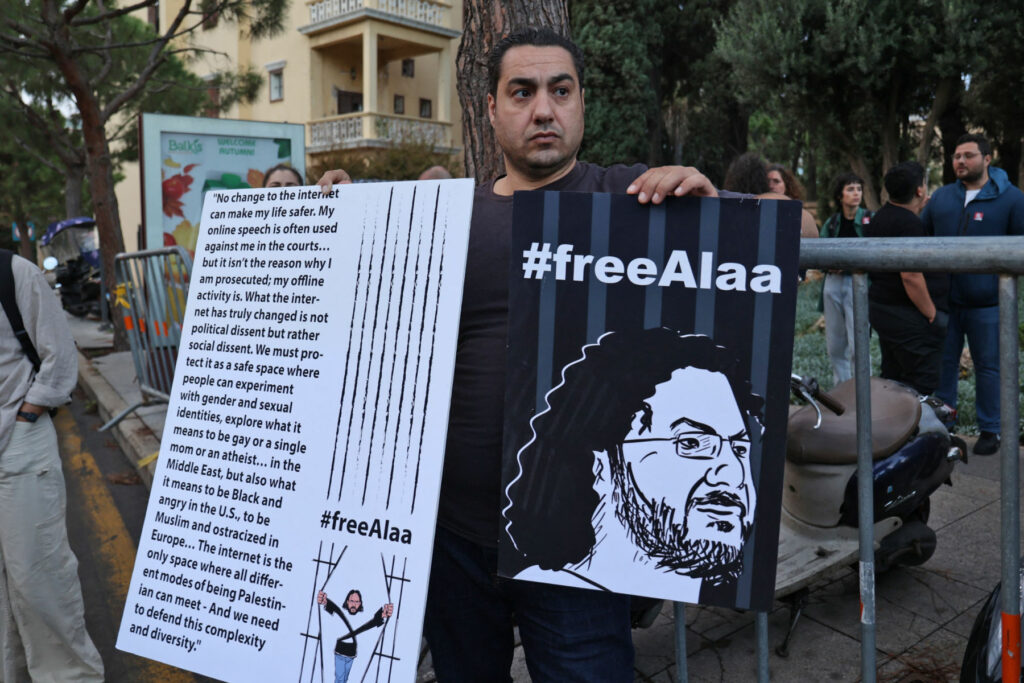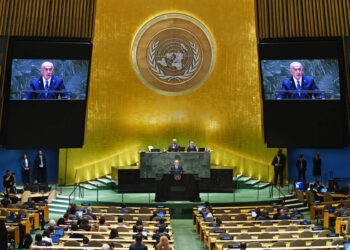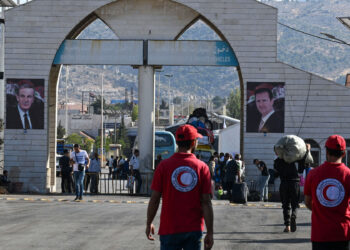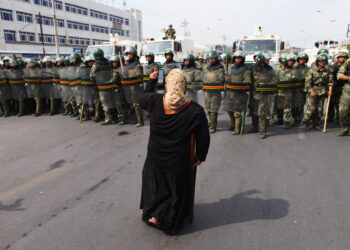Juan Cole is the Richard P. Mitchell Collegiate Professor of History at the University of Michigan. He is also a non-resident fellow at DAWN and a non-resident fellow at the Center for Conflict and Humanitarian Studies in Doha.
U.S. Secretary of State Antony Blinken visited Egypt this past weekend as part of his tour of the Middle East, and he says he used the two days in Cairo to raise the issue of specific political prisoners with the authoritarian government of President Abdel Fattah al-Sisi. Among the thousands of such prisoners, one whom Blinken seemingly mentioned was Alaa Abdel Fattah, the dual Egyptian and British citizen who has been jailed since 2014 and held at the notorious Tora Prison for the past two years. Alaa, a 41-year-old software engineer and blogger, was a major figure in the 2011 Arab Spring protests that unseated longtime dictator Hosni Mubarak. After an hour-long meeting with Sisi, Blinken was asked at a press conference with Egyptian Foreign Minister Sameh Shoukry why Egypt has rebuffed international calls to release detainees like Alaa, including from Washington, which supplies Egypt with $1.3 billion of military aid each year.
"I can't answer for you why the government does or does not do certain things," Blinken said of Sisi's regime. "Those are its prerogatives."
The Biden administration held back 10 percent of that annual allotment last fall because of Sisi's awful human rights record and his routine jailing of even mild dissidents. With the global spotlight on Egypt as it hosted the COP27 climate conference in early November, Sisi's government freed several hundred political prisoners in a calculated sign of apparent goodwill. In response, Washington released to Egypt $75 million, over half the sum that had been embargoed. As Human Rights Watch documented, however, even as it let some 500 dissidents out of jail last autumn, the government was arresting other prisoners of conscience. And once COP27 ended, some of those who had been freed earlier were rearrested. Thousands of prisoners of conscience still languish in Egypt's prisons; the exact number is a closely held secret.
Alaa Abdel Fattah's vision of a very different Egypt, along with that of millions of young Egyptians, has itself been imprisoned by Sisi's regime.
- Juan Cole
Alaa went on a hunger strike in 2022 that his family members feared would end in his death, before he brought it to a close in mid-November. Last week, on Jan. 25, the 12-year anniversary of the beginning of the 2011 protests that led to Mubarak's fall, supporters and family members held a vigil for Alaa outside the Egyptian embassy in London. Alaa was arrested in the fall of 2013, following Sisi's brutal military coup, on charges of holding a demonstration without government permission. This draconian law was passed by an obedient Egyptian parliament in the wake of that coup against the only elected president modern Egypt has ever had, Mohammed Morsi. In 2015, tapes surfaced implicating Sisi and the rest of the senior officer corps in Egypt's military in orchestrating massive street protests involving millions of demonstrators in June of 2013 in a bid to bring down Morsi. It is grimly ironic, then, that Sisi's government should be holding Alaa for protesting with a few dozen others against the rewritten 2013 constitution, which was drafted by a subservient committee appointed by Sisi to replace the constitution for which a majority of Egyptians had voted the previous year.
Alaa is only the most famous face among thousands of political prisoners who are regularly abused and tortured by Egyptian prison authorities and security forces, according to Human Rights Watch, "including with systematic sexual violence to degrade them with near-complete impunity." Even children are not spared. When small protests were staged in Cairo against Sisi in 2019, his government responded by putting over a hundred people on trial en masse, including teenagers. Last month, a special terrorism court in Cairo sentenced 22 of those minors to jail terms of between five and 15 years just for having posted YouTube videos and social media messages in connection with the protests. Some 39 adults have also been sentenced by the same court, the judgments of which cannot be appealed. The defendants had not, of course, actually committed any terrorist acts. But it was another sign of the costs of protesting in Sisi's Egypt.

His regime also menaces journalists over printing any stories that are held to "defame" Egypt, while it arbitrarily blocks hundreds of websites. Last August, Mada Masr, a highly respected news outlet that is one of the only independent media voices left in Egypt, published an exposé on the Nation's Future Party, which vigorously backs Sisi's regime. The party clapped back with a lawsuit, but less civil means were also deployed. In early September, prosecutors charged Mada Masr's editor-in-chief, Lina Attalah, with running an "unlicensed website." They also charged her and three other Mada Masr journalists—Rana Mamdouh, Sara Seif Eddin and Beesan Kassab—with "spreading false news" and defaming the Nation's Future Party faithful.
It is not only political dissent or journalism itself that Sisi's regime is attempting to ban. Even though there is no formal law against homosexuality on the books in Egypt, the authorities frequently prosecute LGBTQ+ people under a vague "debauchery" statute that originally was passed against prostitution. The state uses cybersurveillance to harass the LGBTQ+ community, and even sets secret police to entrap people on gay dating apps. This obsession with the private lives of Egyptian citizens is of a piece with the government's demand for political conformity.
Wrist-slapping and mild rebukes are not enough to change a culture of impunity in Cairo's halls of power.
- Juan Cole
Sisi's crusade to control Egyptian society is now veering into the realm of science fiction. As he dresses his dictatorship up in the trappings of Egypt's pharaonic past, he also dreams of a gleaming new capital in the desert some 28 miles east of Cairo. Construction is underway at a cost of tens of billions of dollars—part of a half-baked and debt-driven building spree. Sisi plans to equip the new administrative capital—home to relocated government ministries far away from potential protesters in Cairo—with 6,000 CCTV cameras that will monitor the city's future residents 24 hours a day. Although such cameras are also ubiquitous in Britain, Sisi's regime probably has more sinister aims than public safety in deploying that kind of mass surveillance. Residents of what is being billed as a "smart city" will routinely have their privacy invaded without their permission, likely in search of dissidents.
Alaa Abdel Fattah's vision of a very different Egypt, along with that of millions of young Egyptians, has itself been imprisoned by a wide-ranging regime of censorship. That the United States backs this police state—little different from that of Myanmar or other international pariahs—is shameful. Wrist-slapping and mild rebukes are not enough to change a culture of impunity in Cairo's halls of power.
I called Alaa once when I was in Cairo, before his imprisonment. He was unavailable to get together because he was on his way to Alexandria to commemorate Khaled Said, a 28-year-old beaten to death by Egyptian police on June 6, 2010. A Facebook page was soon launched, "We Are All Khaled Said," where thousands of young Egyptians flocked to share information about his case and outrage over rampant police abuses under Mubarak. The public outcry over Said's death helped fuel the 2011 uprising that toppled not only Mubarak but his hated interior minister, Habib al-Adly, who ran Mubarak's police state; Khaled Said became a rallying cry in Tahrir Square. I did not know then that I would come to feel as though, for all of us who care about human rights in Egypt, we are all Alaa Abdel Fattah.







